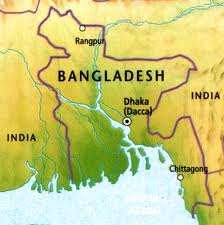 New Delhi, February 12: Fundamentalist Jamaat-e-Islami activists vandalised several Hindu temples in the Hathazari area of Chittagong in Bangladesh on Thursday and Friday, forcing the law enforcement authorities to impose Section 144 of the Bangladesh Penal Code that bans public gatherings in the affected area.
New Delhi, February 12: Fundamentalist Jamaat-e-Islami activists vandalised several Hindu temples in the Hathazari area of Chittagong in Bangladesh on Thursday and Friday, forcing the law enforcement authorities to impose Section 144 of the Bangladesh Penal Code that bans public gatherings in the affected area.
According to the website bdnews.com, Muslims, allegedly instigated by the fundamentalist Jamaat-e-Islami, first damaged a temple in the compound of the Loknath Sebasram at Nandirhat on Thursday evening and blocked the Chittagong-Rangamati Road on Friday morning in retaliation to a mosque being damaged by people coming out of the Loknath Sebasram.
The website report further said that at least three other Hindu temples were attacked by the Islamic activists.
It said that damage was inflicted on the Sri Sri Jagadeshwari Ma Temple, the Jagannath Bigroho Temple at Nandirhat and the Kalibari Temple in Sadar Upazila. The Sri Sri Jagadeshwari Ma Temple was also burnt, it added.
The Primary and Mass Education Minister of Bangladesh, Afsar-ul-Ameen, has visited the area and instructed local authorities to take steps to normalise the situation.
Local administration officials blamed the Jamaat-e-Islami and its student wing, the Islami Chhatra Shibir, for the incidents.
Reacting to the incident, liberal and secular minded people in Bangladesh said such events could pose a threat to the country’s secular fabric.
Haroon Habib, a 1971 war veteran and a senior journalist, told ANI in a telephonic interview that: “These are very tragic events. Bangladeshis were never communal even under military rule. People must see a definite political motive behind these events.”
He added: “There is a definite extremist political agenda behind these attacks. There are elements who want to destabilise the incumbent Hasina Government.”
Haroon also blamed the local administration for not acting tough against fundamentalist elements in the area.
Allegations have it that houses belonging to Hindus in the area were also vandalised. Leaders of the minority Hindu community have blamed the ”indifference” of the administration for the prevailing situation.
Rejecting suggestions of fundamentalism being on the rise in Bangladesh, Haroon said there was no existential threat to the current regime, but he cautioned the Sheikh Hasina government not to be complacent.
He also opined that there were many elements in Bangladesh who were unhappy with Sheikh Hasina’s close ties to New Delhi, as also her move to make the Constitution of the country more secular.
Recently, the Bangladesh Army had foiled a coup attempt by retired and serving Army officers who had fundamentalist leanings.
India has said that it is keeping a close watch on emerging developments in both Bangladesh and Maldives.
Courtesy: ANI


